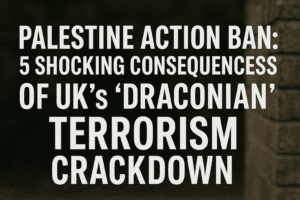Palestine Action Ban: 5 Shocking Consequences of UK’s “Draconian” Terrorism Crackdown
The UK government has banned Palestine Action, a protest group targeting Israeli arms suppliers, under anti-terrorism laws—making membership or support a crime punishable by up to 14 years in prison. The group, known for disrupting weapons factories like Elbit Systems, denies advocating violence, arguing its actions aim to prevent harm. A last-minute legal challenge failed, with courts ruling the ban should take effect immediately, despite concerns over free speech.
Critics warn the move conflates civil disobedience with terrorism, setting a dangerous precedent for protest rights. The decision, backed by Parliament, followed government consultations with pro-Israel groups but excluded Palestinian voices. Hundreds protested the ban, with activists vowing to defy it, risking prosecution. A judicial review on July 21 could overturn the ruling, but for now, the crackdown signals a hardening stance against direct-action movements. The case raises urgent questions about democracy, dissent, and the escalating suppression of activism in Britain.

Palestine Action Ban: 5 Shocking Consequences of UK’s “Draconian” Terrorism Crackdown
In a landmark—and controversial—decision, the UK government has officially banned Palestine Action, a direct-action protest group targeting companies linked to Israeli arms manufacturing. Starting Saturday, membership or public support for the group carries a prison sentence of up to 14 years under anti-terrorism laws.
Why Was Palestine Action Banned?
The group, known for occupations and vandalism of sites like Elbit Systems’ factories (a major supplier to the Israeli military), has been placed on the UK’s proscribed organizations list—alongside groups like ISIS and Al-Qaeda. The Home Office argues its tactics meet the legal definition of terrorism, citing property damage and disruption.
But critics call the move a dangerous overreach:
- Free Speech Concerns: Civil liberties groups warn this conflates nonviolent civil disobedience with terrorism, chilling protest rights.
- Political Bias?: Lawyers for co-founder Huda Ammori claim the government consulted Israeli-linked lobbyists but not Palestinian advocates before the ban.
- Global Backlash: UN experts and hundreds of UK lawyers have condemned the decision, calling it “draconian” amid global outcry over Gaza.
A Legal Hail Mary Fails
Ammori’s legal team fought to delay the ban, arguing:
- The group’s aim—disrupting arms production—is fundamentally anti-violence.
- The rushed proscription leaves the public “in the dark” about what constitutes criminal support.
Courts rejected the appeal, with judges emphasizing the government’s broad discretion in anti-terrorism cases. A full judicial review will be heard July 21, but for now, even holding a “I support Palestine Action” sign could risk prosecution.
Protesters Defy the Ban
Hours before the ban took effect, hundreds gathered outside London’s Royal Courts of Justice, chanting “We are all Palestine Action.” Meanwhile, Defend Our Juries announced plans to protest in Parliament Square—knowingly risking Terrorism Act charges—with signs opposing genocide.
The Bigger Picture
This ban sets a precedent:
- Direct-Action Protest Under Threat: If Palestine Action qualifies as “terrorist,” could other disruptive movements (e.g., Just Stop Oil) face similar crackdowns?
- Silencing Dissent?: With UK arms sales to Israel under scrutiny, critics accuse the government of shielding military trade from accountability.
What’s Next?
All eyes are on the July 21 judicial review. If the ban holds, the UK may see:
- More arrests of Palestine solidarity activists.
- Legal battles over the definition of “terrorism” versus protest.
- Escalated tensions between protest rights and national security policies.
For now, the message is clear: the UK government is willing to wield anti-terror laws against activists—and the fallout could reshape protest freedoms for years to come.
You must be logged in to post a comment.